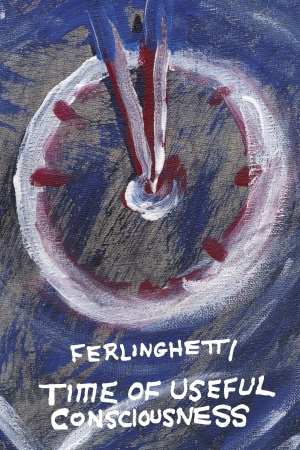Time of Useful Consciousness
Gray Tolhurst
2/19/2013


“Time of Useful Consciousness is a fragmented recording of the American stream-of-consciousness, always westward streaming, a people’s poetic history in the tradition of William Carlos Williams’ Paterson, Charles Olson’s Maximus, Allen Ginsberg’s Fall of America, and Ed Sanders’ America: A History in Verse.”
Admittedly, I stole the first words of this book review from the author (Lawrence Ferlenghetti) himself. Yes, he wrote the synopsis on the back of his own book but, the man is ninety-three years old and still writing books, so we can give him the benefit of the doubt on this one. Still, I think his succinct description stands up as better summation than any thing I could formulate. But there is another reason, I chose Ferlenghetti’s words as my opening: If Time of Useful Consciousness is a recording of “America” then there must be some plagiarism involved, right? You would be right; the entire book is practically dripping with appropriation. Time of Useful Consciousness reads less like a poem and more like a transcription of the sounds and scenes that whiz by outside the backseat window of a car on the highway. Time of Useful Conciousness is peppered with shreds of folk songs and lines from Ferlenghetti’s contemporaries like Jack Kerouac and Allen Ginsberg.
Ferlenghetti sees himself and his Beat companions (now mostly deceased) as a continuation of a great American tradition of independence of the spirit. Twain, Whitman, Kerouac: these are the heroes of Ferlenghetti’s America. At times, Time comes off as a pastiche of Beat-era poetics. Of course, if anyone has the right to do this it is Ferlenghetti, who practically manages the San Francisco Beat Empire from his shop City Lights.
It is hard to tell if Ferlenghetti has chosen to do this as an homage or as a nostalgic rant about his illustrious “Golden Age.” But Ferlenghetti is not entirely stuck in the past, references to Harry Belafonte nuzzle themselves among “skateboards and Adidas” but it all comes on a bit slapdash and forced. Perhaps Time of Useful Consciousness is best read as an alternative history textbook: the America divorced from the rosy imaginings of patriots and freedom. The chaotic ramble begins in New York, “…Sailing westward/from the crenellated old world/ of over-age Camembert Europe” and continues through the faded cowboy landscapes of the Old West before finally rolling to a thunderous halt in Ferlenghetti’s Canaan—San Francisco. “And this truly is the end of the line/ the end of the long, long trail a-winding/ Land’s End the last frontier/ with no further West to go/ the ideal place the final home/ so longed-for over the Great Plains/ over the Great Divide”. For Ferlenghetti, America “tilted westward and the population shifted with it/ and it took almost a decade/ for all the elements of changed America/ to come together/ to coalesce” and he has sat growing old in his bookstore, yelling from “the seven hills”, yelling into the western wind for all to hear.
At an age when most people are editing their gravestones, Ferlenghetti is mounting a poetic offensive. For Ferlinghetti, now is not the time for the long-winded verses of yore but for rallying cries and chants in the fields for the reclamation of America, for the freeing of the wage-slave serfs and television junkies, for the unearthing of something that has been buried under newsprint and lottery tickets, for a Third Great Awakening that takes place not in Revivalist tents but in the streets of towns and cities across America.
